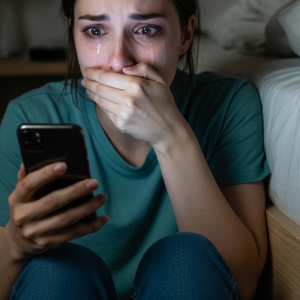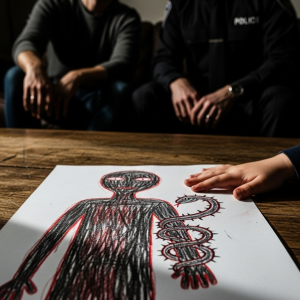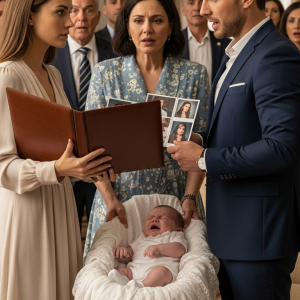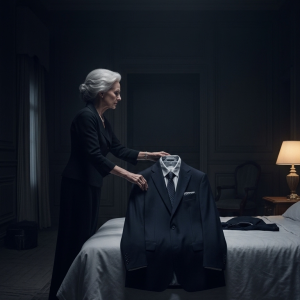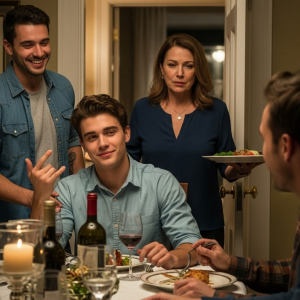Hello everyone,
Has anyone here ever felt that your job defines you, but that it’s also destroying your private life? I am a forensic pathologist. I find truth in the silence of death. But in the eyes of my husband’s family, I bring the “smell of the corpse” home with me. They are using that as a weapon against me, to separate me from my son. And I’m discovering that these hands they consider “soiled,” are the only ones that can wash away a secret far filthier than they could ever imagine.
There are two versions of me.
The first version is Dr. Clara Vance, forensic pathologist for the New York Medical Examiner’s Office. This version lives and breathes in a world of stainless steel, cold surgical lights, and an absolute stillness broken only by the hum of the ventilation system. Under the harsh fluorescent lights, I am a queen in my own kingdom. My hands, encased in double-layered latex gloves, move with precision and purpose. My mind is an analytical machine, seeing through lies written in blood and tissue. I am the final interpreter for the victims who have been permanently silenced. My colleagues respect me. Detectives, though sometimes grudgingly, have to admit that I can see the sophisticated symphonies in the chaos of death.
Today, that symphony was particularly complex. The victim was a man found in his Upper East Side apartment, no signs of forced entry. A faint ligature mark on his neck led the initial team to rule it a suicide. But something was off. A minute asymmetry in the placement of the mark, a nearly invisible scratch under a fingernail.
“Not a suicide,” I spoke into my recorder, my voice even and detached. “The ligature mark shows abnormal slack at the left angle, indicating uneven pressure. The victim struggled. Re-check security footage on the service exit, not the elevator. The killer knew this building.”
I put down my scalpel. Another mystery solved. I felt a brief satisfaction, a sense of order restored. This was a world I could control.
And then, I walked out of the autopsy suite, shed my blue gown, peeled off my gloves, and the first version of me dissolved.
The second version began to take shape. Just Clara. A thirty-six-year-old woman, and a failing mother.
I go through a decontamination process that is almost an obsessive ritual. I shower, wash my hair, scrub under each fingernail until the skin is raw, trying to wash away not just the microbes, but the scent of death, the residue of tragedy. I don’t want to bring anything from my world home. Especially when “home” is a video call away.
I sat in my cozy but empty Brooklyn apartment, where the only remaining warmth came from my son’s drawings taped to the fridge. I pressed the call button. The screen lit up, and the face of Leo, my eight-year-old son, appeared. My heart clenched, a pain both sweet and bitter.
“Mommy!” he cheered, his eyes shining. “Today at school I…”
But he never got to finish. A figure appeared behind him. Eleanor Sterling, my mother-in-law, a quintessential London matriarch with perfectly coiffed platinum hair and a string of pearls that never left her neck.
“Leo, what have I told you?” Her voice wasn’t harsh, but velvet-soft, which made it all the more lethal. “Don’t speak with your mother for too long. Do you have any idea how frightening the germs from her workplace are?”
She didn’t even glance at the camera. To her, I didn’t exist. I was merely a source of contamination.
Leo looked at me, his eyes filled with confusion and guilt. “I’m sorry, Mommy…”
And then, the screen went black.
I sat in stunned silence, staring at my own reflection in the dark screen. I had won a battle for a dead stranger but was losing the war for my own son. My apartment fell silent again. But this wasn’t the powerful stillness of the lab. This was the silence of loneliness, of emptiness.
My phone rang. It was my husband, Liam. Or rather, my soon-to-be-separated husband.
“Clara,” his voice came through, tired and distant. “Calling to let you know a big case just broke. I might be tied up for a few days.”
“Okay,” I replied. Our conversations were now just status reports, logistical arrangements. No warmth, no concern. Only silent gaps between the words.
“How are my parents?” I asked, a meaningless social courtesy.
“The usual,” he evaded. “You know them.”
Yes, I knew them. I knew General Arthur Sterling, his father, a man who looked at me as if I were a stain on his immaculate military uniform. I knew Ethan, his brother, a razor-sharp lawyer who was using every statute to prove that a forensic pathologist was an unfit mother. And I knew Eleanor, the woman who was poisoning my son’s mind with fear of his own mother’s work.
“Stay safe,” Liam ended the call with his usual phrase. A polite but soulless sign-off, like an automated message.
He didn’t ask if I was okay after the call with Leo. He didn’t ask about my work. He simply reported and disconnected. He had chosen to avoid conflict by withdrawing from my life, piece by piece.
I put the phone down. I was completely isolated. On one side was the world of the dead, where I was the expert. On the other was the world of my in-laws, where I was the outcast. And in the middle, was Liam, a fading ghost. I knew a fight was coming, a legal battle for custody of Leo. And I knew the Sterling family would stop at nothing.
Two days later, my world and Liam’s collided in the most brutal way possible.
I was called to a crime scene at three in the morning. Sirens blared and flashing red and blue lights pulsed against a luxury penthouse in SoHo. As I stepped under the police tape, I saw Liam standing there, speaking to an officer. He saw me, and a flicker of a frown crossed his tired face.
“Dr. Vance,” he said, his tone purely professional, as if we were just two distant colleagues.
“Detective Sterling,” I replied, trying to keep my voice from shaking. “What have we got?”
The victim was Johnathan Harrington, a notorious financial tycoon, found dead on his study floor. There was a blunt-force trauma wound to his head and a small pool of blood. It seemed straightforward. A robbery gone wrong, or a fight.
I began my work, intense focus immediately taking over, pushing aside all personal feelings. I noted the body temperature, the state of rigor mortis, the injuries. But as I was examining the body, Liam’s phone rang. He stepped out onto the balcony to take it, but the angry voice on the other end was loud enough for me to catch fragments.
It was General Arthur Sterling, calling from London.
“…Harrington has been a business partner of this family for twenty years! This is going to be a media disaster! I don’t want the family name dragged into this mess. And Liam, be careful. Don’t let that woman tarnish our family’s reputation with this.”
That woman. Me.
Liam came back inside, his expression even more strained. The pressure was on him from both sides: a high-profile murder and a powerful family watching his every move.
“Looks like a robbery-homicide,” he said to me, a hint of impatience in his voice, as if he wanted this case closed as quickly as possible.
I didn’t answer right away. I was kneeling beside the body, and my eyes had caught something strange. A minuscule, almost invisible detail. On Harrington’s wrist, under his expensive Rolex, was a tiny needle mark, already beginning to bruise.
“It’s not that simple, Detective,” I said, looking up at him. “The head wound could be a misdirection. I think the victim was injected with something.”
Liam stared at me, his expression a mixture of annoyance and a sliver of doubt. I knew what he was thinking. I was complicating things. A problem his family wanted solved quickly and cleanly.
This was no longer just a case. It had become the stage upon which my competence and Liam’s loyalty were to be tested. And I knew, the curtain had only just been raised.
In the following days, the storm hit from all directions.
At the lab, the toxicology report confirmed my suspicion. Johnathan Harrington didn’t die from the blow to the head. He died from an extremely rare plant-based poison, a slow-acting toxin that induces cardiac arrest after several hours. It’s nearly undetectable without specialized tests. My discovery, instead of being welcomed, brought Liam’s investigation to a dead end. The robbery-homicide theory was out. There was no forced entry, nothing was missing. The killer had to be someone he knew, someone who was with Harrington hours before he died.
Liam was getting pressure from his superiors. The press was starting to sniff around. And I, instead of being a partner, had become the source of the problem. During a briefing, he couldn’t hide his frustration. “Are you sure, Clara? A ‘rare poison’? Or is this just some common allergen you’re blowing out of proportion?”
The words were a slap in the face. He wasn’t just questioning my conclusion; he was questioning my competence. The pressure from his family was beginning to erode the respect he once had for me.
And just as I’d predicted, the Sterlings didn’t stay in London. They flew to New York under the plausible guise of offering Liam “moral support” during a difficult case. But I knew their real purpose. They were here to control the narrative and accelerate the custody battle.
They took a suite at The Carlyle and turned it into their command center. Eleanor, on her first visit to Liam’s precinct, publicly humiliated me in front of his colleagues. She dramatically pulled out a silk handkerchief, covering her nose and mouth. “Oh, Liam,” she said, loud enough for everyone to hear. “I can’t imagine how you work in a place where the air is thick with chemicals and… decay. It’s so unhealthy.”
Simultaneously, Ethan, the lawyer brother, made his official move. I received a letter from the court. An emergency petition demanding my full parental rights be revoked, allowing me only supervised visits. The stated reason: my job involves “frequent exposure to hazardous pathogens, decomposing remains, and violent imagery, creating an unstable and psychologically dangerous environment for an eight-year-old child.”
They were turning my expertise into a weapon against me. They were turning my love for science into proof that I was a bad mother. I felt cornered, isolated, and exhausted.
I didn’t sleep that night. I sat in my lab, surrounded by cold equipment, and threw myself into researching the mysterious poison. I read every paper, every study I could find. I had to prove I was right. It was the only way I could fight back.
And then, in an old British medical journal from the 90s, I found it. A detailed article about a rare case of poisoning from a plant containing this exact toxin. I read voraciously, noting the symptoms: cardiac arrhythmia, mild hallucinations, respiratory failure…
And then I froze.
Those symptoms… they were eerily familiar. I turned to my computer, accessed my personal archives where I kept a few old files from my time working in London. I opened an old case file. It was a copy of the death record of Charlotte Devereaux. Eleanor’s sister. Who had died in a “tragic accident” thirty years ago from “a fall down the stairs after a sudden dizzy spell.”

I compared the two reports. The symptoms described in Charlotte’s old file—the “dizziness,” the “abnormally rapid heartbeat” before the fall—were a perfect match for the poisoning symptoms in the medical journal.
A chill ran through me. This was not a coincidence.
The murder in New York and the “accident” in London thirty years ago were connected by the same silent symphony of death. And suddenly, I realized that Eleanor’s obsession with “cleanliness,” her pathological hatred of medicine and death, might not just be prejudice. It might be a grief, a suspicion, that had been buried for three decades.
My fight was no longer just for my son. It had just become a quest for justice for another victim, one from the very family trying to destroy me.
I knew I was holding a bombshell. But I couldn’t take it to Liam. He was caught in the crossfire, and I wasn’t sure which side he would choose. I couldn’t use it against Ethan in court, either. It was too speculative, not enough proof.
I had to do something incredibly bold, something that went against all the rules. I had to confront the source of the hostility directly. I had to talk to Eleanor.
Using my personal connections, I called a trusted former colleague at the London coroner’s office. I told him my theory, and though hesitant, he agreed to help me retrieve the original case file for Charlotte Devereaux. A few days later, an encrypted file arrived in my email. Inside were old, black-and-white crime scene photos and the perfunctory autopsy report from three decades ago.
I had no doubt left. The faint bruises on Charlotte’s body were inconsistent with a simple fall. There had been a struggle. The investigation back then had been sloppy, or deliberately shut down.
I arranged a private meeting with Eleanor. I called the hotel, not identifying myself as Clara. I simply said, “This is Dr. Vance. I have information regarding the Johnathan Harrington case, and I need to speak with Mrs. Sterling privately.”
She agreed.
I walked into the lavish suite at The Carlyle. Eleanor was sitting on a velvet sofa, her back ramrod straight, a teacup on the table before her. She looked at me with cold eyes, ready for another battle over Leo.
I didn’t sit down. I walked directly to the glass coffee table and opened my briefcase. I didn’t lay out photos of Leo or Ethan’s petition. I laid out the black-and-white crime scene photos from thirty years ago.
“Mrs. Sterling,” I said, my voice not that of a daughter-in-law, but of a pathologist presenting a case. “I’m not here to talk about Leo. I’m here to talk about Charlotte.”
The smugness on Eleanor’s face froze, replaced by an undisguised shock.
“I believe your sister, Charlotte, was murdered,” I continued, looking her straight in the eye. “And the killer is still at large.”
I pointed out the inconsistencies in the old accident report. I placed it next to Johnathan Harrington’s toxicology analysis. I explained the rare poison, the matching symptoms. And then, I said what I had been thinking for nights.
“I’ve always wondered why you hated my work so much. Why you were so obsessed with ‘cleanliness’ and ‘germs.’ I thought it was class prejudice. But now I understand. That obsession isn’t a fear of dirt. It’s a fear of a ‘dirty’ truth that was never brought to light. You hate forensics because you feel it failed to bring justice for your sister thirty years ago.”
Silence filled the room. Eleanor’s rigid, aristocratic shell began to crack. Her shoulders trembled. And then, she broke down, burying her face in her hands and sobbing. The suppressed grief of thirty years.
When she looked up, her eyes were red, all arrogance gone, replaced by pure pain.
“He killed her,” she whispered, her voice hoarse. “I always knew it. But no one believed me. His family was too powerful. He had a perfect alibi.”
“Who was he?” I asked, though my heart already knew the answer.
Eleanor looked at me, her eyes filled with hatred. “Charlotte’s fiancé. The man who was with her that night but had theater tickets from somewhere else as an alibi. The man whose family did everything to protect him.”
“What was his name, ma’am?”
“Johnathan Harrington.”
The bomb had detonated. Clara, the daughter-in-law deemed “soiled,” was the only person who could cleanse the stain of the past that Eleanor had carried her entire life. My job was no longer despicable. It had become her only hope.
From that moment on, everything changed. Eleanor Sterling, my greatest enemy, became my most unexpected and powerful ally. The custody battle for Leo was temporarily set aside. In its place was a new war, a war for justice for Charlotte.
Eleanor provided me and Liam with invaluable information. She spoke of the past, of Harrington’s controlling and cruel nature, of how he had manipulated and isolated Charlotte. She even remembered a crucial detail: Harrington had a son from a previous marriage, a boy who had always seemed to resent Charlotte. He was also an expert in chemistry and botany.
Working from Eleanor’s lead, combined with my scientific evidence, Liam began to see the case in a completely new light. He no longer doubted me; instead, there was admiration and a hint of regret. He mobilized his entire team to investigate Harrington’s son, a man named Julian who now managed an investment fund.
The evidence started pouring in. Julian was drowning in gambling debt. He was the primary beneficiary of his father’s death. And most damningly, credit card records showed that six months prior, he had purchased a large quantity of seeds from the very plant that produced the poison from a supplier in South America.
The motive was clear. Julian had killed his father, but not just for the money. In a final, symbolic act of cruelty, he had used the exact same type of poison his father had used to kill Charlotte years ago, as if to “inherit” the family’s legacy of crime.
Liam later told me about the interrogation. At first, Julian was arrogant, sitting with his arms crossed, speaking only through his lawyer. But as Liam laid the evidence on the table—the bank statements showing massive gambling debts, the receipt for the poison seeds, the cell phone data placing him near his father’s penthouse on the night of the murder—Julian’s composure began to crack.
And when Liam placed an old photograph of Charlotte Devereaux on the table, Julian broke.
But it was not a collapse of remorse. It was a collapse of hatred, of a dam that had been holding back for too long. He started talking, and once he started, he couldn’t stop. He admitted everything, not with repentance, but with a sick pride.
“You think I did it for the money?” Julian laughed, a dry, pained sound. “No. I did it for her. For Charlotte.”
He leaned back, his gaze distant. “When my father brought Charlotte home, I was just a lonely fifteen-year-old kid. My father, Johnathan, treated me like a line item from his first marriage contract. But Charlotte… she was different.”
“She was the only one who ever really saw me. She asked about my hobbies, about the stars I loved to watch, about the complex structure of a fern leaf. My father called my passion for chemistry ‘bookish,’ but she bought me my first proper chemistry set and an old, leather-bound botany encyclopedia. I remember her pointing to a drawing of an oleander plant and saying, ‘See, Julian? Magic is right here. It can be a cure, or it can be a deadly poison.’ She told me, ‘It’s better to create small explosions in a lab, Julian, than big ones in your life.’ She was the only light in my world.”
Julian’s hands clenched into fists. “And then, she started to see the real monster in my father. She discovered his money laundering, his dirty deals. She gave him an ultimatum: turn himself in, or she would go to the police.”
“My father told me about that night,” Julian continued, his voice shaking with rage. “Years later, in a drunken stupor, he clapped me on the shoulder and laughed. ‘Never let a woman get in your way,’ he said. He bragged about how he’d calmly mixed the poison into her insulin syringe, how he’d watched her grow dizzy and collapse, all while holding theater tickets for his alibi. He called it ‘liquidating a bad investment’.”
“In that moment,” Julian looked straight at Liam, “I no longer saw a man. I saw a monster who had stolen the only person who ever truly loved me. And I swore, one day, I would make him pay. Revenge was my primary motive.”
“I wanted him to die just as she had: quietly, without a trace. It wasn’t inheriting a crime. It was executing a sentence. I used his own weapon against him. It’s a legacy, isn’t it? Very poetic.”
The day Julian was arrested, the entire Sterling family was in New York. That evening, we gathered in the hotel suite. Liam, looking exhausted but resolute, recounted Julian’s entire confession.
When he finished, Eleanor was sobbing, tears of a thirty-year release mixed with the horror of what her sister had endured.
General Arthur, the man of honor, sat in stunned silence. His face was a mask of disgust. “Filth,” he finally uttered, a single word dripping with contempt. I knew he wasn’t just talking about the Harringtons, but about his own prejudices against me.
But my eyes were on Ethan. The sharp lawyer sat pale and shaken. His entire case, built on the premise that my work was “dirty,” had been spectacularly demolished.
Eleanor, composing herself, turned to her eldest son, her eyes like chips of ice. “Ethan. Drop the petition. Now.”
Ethan flinched. “Mother, I… I will review the details…”
“There’s nothing to review, Ethan,” I cut in, my voice quiet but clear. The room turned to me. “Your entire case rested on my job being ‘unclean.’ Yet that very job just cleansed a stain your family has carried for thirty years, a stain no lawyer could touch. If you still want to go to court and argue the definition of ‘cleanliness,’ I’d be more than happy to.”
It was a checkmate. Ethan looked at me, then at his parents. He knew he had lost. Without a word, he took out his phone and stepped onto the balcony. He returned a few minutes later. “It’s done.”
That evening, the custody petition was voluntarily withdrawn.
A few months later, on a crisp autumn afternoon in Central Park.
I was with Leo, tossing breadcrumbs to the ducks. He no longer shied away from questions about my work. On the contrary, he told his friends with pride, “My mom’s a scientist. She helps the police find the bad guys.”
Liam approached with two hot chocolates. He sat on the grass beside me, a habit he’d kept for months. The awkwardness between us was gone, replaced by a new comfort. He told me he’d officially transferred to the organized crime division, a job with fewer sudden homicide calls. “I want to be home in the evenings,” he said, his voice low and sincere. “I want to be a real father.”
He looked at me, his eyes full of a regret I’d seen many times in the past weeks. “Clara, I know ‘sorry’ isn’t enough. I was a coward. I let family pressure cloud what was most important… you and Leo. I doubted you when I should have been the first one to defend you. I’ll never forgive myself for that.”
I was silent, watching the lake. A part of me wanted to believe him, but the part that had been so deeply hurt screamed at me to be cautious.
Liam continued, his voice trembling slightly. “But please… give me a chance to make it right. Not to go back to how we were, but to build something new, something better, on the truth we found together. I see the real you, Clara. You’re an extraordinary woman. And I want to be the man who deserves you.”
Just then, my phone rang. The screen read “Eleanor.” I glanced at Liam, then smiled and answered. A few months ago, this call would have been a nightmare. Now, it was a comfort.
“Clara, dear, how are you and Leo?” her voice came from London, no longer sharp, only warm. She told me she had started a charitable foundation in her sister’s name, The Charlotte Devereaux Fund, dedicated to funding breakthrough research in forensic science.
“Thank you, Clara,” she said, her voice thick with emotion. “For giving Charlotte her voice back.”
I hung up, filled with a deep sense of peace. I looked at Liam, who was watching me with hopeful eyes. I looked at my son, running happily on the grass, his laughter clear and carefree. The wound inside me might never fully heal, but for the first time in a long time, I felt I could open my heart again.
I said nothing. I just gently reached out and took his hand.
Liam squeezed my hand, a look of relieved happiness on his face. The passionate love of our youth might be gone, but in its place was something more precious: a love reborn from understanding and respect, built on a foundation of truth.
I had won the fight for my son and my dignity. But now, I realized the greatest victory wasn’t freedom in solitude, but the courage to forgive and rebuild. I had proven that the “truth” I searched for in cold laboratories wasn’t just for convicting the guilty; it also had the power to heal the deepest wounds of the human heart.
I smiled, watching Leo run towards us. The symphony of my life was no longer a solo. It was becoming a family ensemble, and we would write the next movement together.
